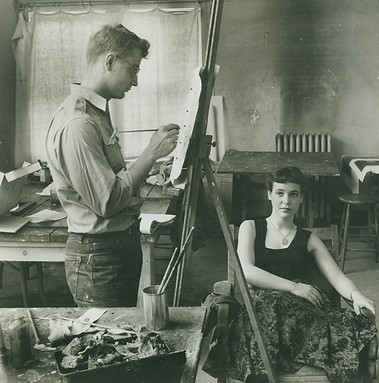
There are so many ways that her life brings together a rich picture of the arts and culture and major themes of past and present. From the Holocaust to Apartheid to the Civil Rights movement--it seems that her work has crossed through many faultlines of the twentieth century as they are interconnected through the arts. What a great topic and a fascinating person.
Naomi André
Associate Professor, Department of Afroamerican and African Studies and Department of Women's Studies
Associate Director for Faculty, Residential College University of Michigan
“Overlooked”, the fitting title for the NYTimes’ course correction for its obituary coverage of the lives of extraordinary women, is a word that easily applies to the career and life of Rhoda J. Levine, the subject of a new documentary film, An Uncommon Woman, currently seeking post-production funding.
A ceiling-busting, pioneering and impactful opera director, choreographer, teacher, and children’s book author, Rhoda paved the way for the women artists that would follow in her wake.
Her story begs to be told.
First gaining notice as a choreographer under the mentorship of Martha Graham, she was told by the great opera and film director, Luchino Visconti, that she herself should direct opera... She was soon directing at Spoleto, the Netherlands Opera, New York City Opera, BAM and numerous other stages in the United States and abroad, including Broadway and the West End.
Importantly, it has been her deeply felt commitment to human rights and social justice that has driven the work. She feels her most important accomplishments touched on these issues: to wit, Der Kaiser von Atlantis, an opera discovered in the Nazi ghetto, Theresienstadt, whose authors were later murdered in Auschwitz.
Rhoda directed the world premiere, forty years after the war.
Later, in Capetown, South Africa, she would go on to direct the post-apartheid premiere of Porgy and Bess.
An “uncommon woman.”




For six years, the director and his crew have had privileged access to Rhoda’s archives, her home, videos and, most movingly, her personal stories about directing, teaching and working with the leading performers and creators of the era. Hers is a story of a woman guiding her art at a time when women were simply not welcome to the table.
In a film that peels away the layers of an elusive artistic legacy, it shines a spotlight on one of those unsung women who has left an indelible imprint on everything she touched.
As Marc Scorca, President and CEO of OPERA AMERICA says, “Although Rhoda’s achievement is remarkable from an artistic perspective, it is important to remember she emerged as a leader in the field at a time when few women rose to positions of influence. Rhoda’s talent and grace triumphed over prejudices and serve as a model for us today.”
The film addresses the nature of that legacy, both artistic and personal. Now, looking back in regret that she never had children, Rhoda struggles to accept the suggestion that the thousands of students, actors and singers who left her artistic “nest” years ago are, in fact, her de facto offspring.
Having worked with a seasoned and talented crew (our Director of Photography, Ramsey Fendall, shot Ethan Hawke’s award-winning documentary Seymour: An Introduction, available on streaming platforms), we have arrived at a critical juncture: principal photography has been completed and major archival research has been compiled.
Funded through a network of individual donors, now via the fiscal sponsorship program of the prestigious nonprofit Center for Independent Documentary, we are seeking leadership, tax-deductible support to take us across the finish line.
In this golden age of documentaries, the world has flocked to films that enlighten and move. That take the initiative and the time to explore hidden corners, and unexamined lives. This includes documentary stories of incredible people who have shaped the world in which we now live. Generous, unassuming but fiercely groundbreaking, Rhoda Levine has lived such a life.
Filled with teachable moments for those who want to know more about the history of women of influence, and those who care deeply about the arts and the lives that make them, An Uncommon Woman is a master class.
And who believe, like we do, that this woman’s life must not be forgotten.
Nor overlooked.


